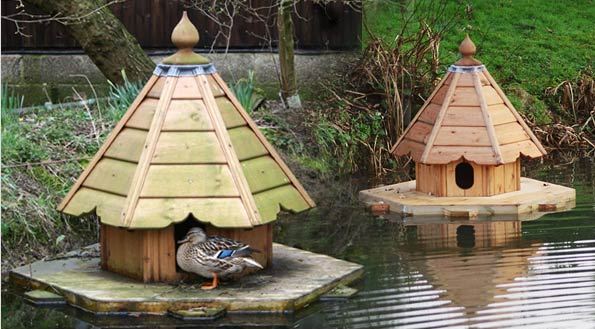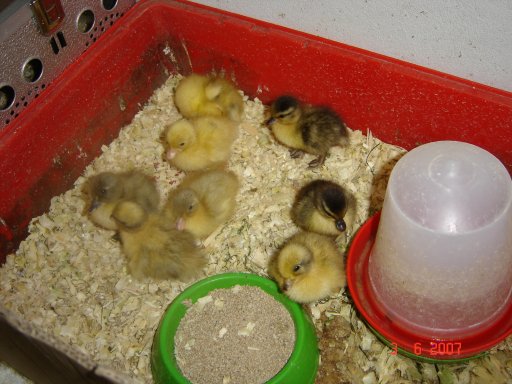Housing
Ducks do not require elaborate houses. The house should be well ventilated, dry and rat proof. The roof may be of shed type, gable or half round. It may have solid or wire floors. The wire floors are not popular with breeders. Under semi-intensive system the house should have easy access to outside run as the ducks prefer to be outdoors during the day time and even during winter or rains. Generally the proportion of night shelter to outside run is 1/4:3/4. The run should gently slope away from the houses to provide drainage. Normally a continuous water channel of size 50 cm wide and 15-20 cm. deep is constructed at the far end, on both sides, parallel to the night shelter, in the rearing or layer house.
 
Water
Though duck is a water fowl and very fond of water, water for swimming is not essential at any stage of duck farming. However, water in drinkers should be sufficiently deep to allow the immersion of their heads and not themselves. If they cannot do this, their eyes seem to get scaly and crusty and in extreme cases, blindness may follow. In addition, they also like to clean their bills periodically and wash them to clear off the feed. While in meat strains a slight increase in body weight of ducks at seven weeks of age has been noticed (weight advantage of swimming ducks to non-swimming ducks is 0.3%), but for egg laying strains, swimming is a disadvantage.
Feeding
Ducks may be grown on dry mash, a combination of dry and wet mash or pellets. Ducks prefer wet mash due to difficulties in swallowing dry mash. The pellet feeding, though slightly costly, has distinct advantages such as saving in amount of feed, minimum wastages, saving in labour, convenience and improvement in sanitary conditions. Ducks are good foragers. The use of range, pond or supplementary green feed, reduces the feed cost.

Feeding
Ducks should never have access to feed without water. During the first eight weeks, birds should always have access to feed, but later on they may be fed twice a day i.e. first in the morning and then late afternoon. Khaki Campbell duck consumes about 12.5 Kg. of feed upto 20 weeks of age. Afterwards the consumption varies from 120 gm and above per bird per day and depending upon the rate of production and availability of greens.
Suggested nutrient requirements for egg and meat type duck
| Characteristics |
Starter duck |
Grower duck |
Layer duck |
Broiler starter duck |
Broiler finisher duck |
| Moisture, % (Max.) |
11.00 |
11.00 |
11.00 |
11.00 |
11.00 |
| Crude protein, % (Min.) |
20.00 |
16.00 |
18.00 |
23.00 |
20.00 |
| Crude fibre, % (Max.) |
7.00 |
8.00 |
8.00 |
6.00 |
6.00 |
| Acid insoluble ash, % (Max.) |
4.00 |
4.00 |
4.00 |
3.00 |
3.00 |
| Salt, % (Max.) |
0.60 |
0.60 |
0.60 |
0.60 |
0.60 |
| Calcium, % (Min.) |
1.00 |
1.00 |
3.00 |
1.20 |
1.20 |
| Phosphorus (Available), %(Min.) |
0.50 |
0.50 |
0.50 |
0.50 |
0.50 |
| Linoleic Acid, % (Min.) |
1.00 |
1.00 |
1.00 |
1.00 |
1.00 |
| Lysine, % (Min.) |
0.90 |
0.60 |
0.65 |
1.20 |
1.00 |
| Methionine, % (Min.) |
0.30 |
0.25 |
0.30 |
0.50 |
0.35 |
| Meth.+ cystine, % |
0.60 |
0.50 |
0.55 |
0.90 |
0.70 |
| Metabolizable energy (Kcal/kg) Min. |
2600 |
2500 |
2600 |
2800 |
2900 |
Minerals and Vitamins
Characteristics |
Starter duck |
Grower duck |
Layer duck |
Broiler starter duck |
Broiler finisher duck |
| 1. Manganese, mg/kg |
90.00 |
50.00 |
55.00 |
90.00 |
90.00 |
| 2. Iodine, mg/kg |
1.00 |
1.00 |
1.00 |
1.00 |
1.00 |
| 3. Iron, mg/kg |
120.00 |
90.00 |
75.00 |
120.00 |
120.00 |
| 4. Zinc, mg/kg |
60.00 |
50.00 |
75.00 |
60.00 |
60.00 |
| 5. Copper, mg/kg |
12.00 |
9.00 |
9.00 |
12.00 |
12.00 |
| 6. Vitamin A, IU/kg |
6000 |
6000 |
6000 |
6000 |
6000 |
| 7. Vitamin D3, IU/kg |
600 |
600 |
1200 |
600 |
600 |
| 8. Thiamin, mg/kg |
5.00 |
3.00 |
3.00 |
5.00 |
5.00 |
| 9. Riboflavin, mg/kg |
6.00 |
5.00 |
5.00 |
6.00 |
6.00 |
| 10. Pantothenic acid, mg/kg |
15.00 |
15.00 |
15.00 |
15.00 |
15.00 |
| 11. Nicotinic acid, mg/kg |
70.00 |
60.00 |
60.00 |
70.00 |
70.00 |
| 12. Biotin, mg/kg |
0.20 |
0.15 |
0.15 |
0.20 |
0.20 |
| 13. Vitamin B12, mg/kg |
0.015 |
0.10 |
0.10 |
0.015 |
0.015 |
| 14. Folic acid, mg/kg |
1.00 |
0.50 |
0.50 |
1.00 |
1.00 |
| 15. Choline, mg/kg |
1300 |
900 |
800 |
1400 |
1000 |
| 16. Vitamin E, mg/kg |
15.00 |
10.00 |
10.00 |
15.00 |
15.00 |
| 17. Vitamin K, mg/kg |
1.00 |
1.00 |
1.00 |
1.00 |
1.00 |
| 18. Pyridoxine, mg/kg |
5.00 |
5.00 |
5.00 |
5.00 |
5.00 |
(Source: www.vuatkerala.org ) |



